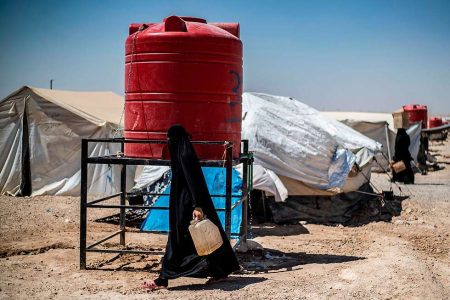
The Islamic State women are a persistent and real threat in the Syrian refugee camps
Stabbing guards, stoning aid workers and flying the Islamic State’s black flag in plain sight: the wives and children of the ‘caliphate’ are sticking by the extremists in a desperate Syrian camp.
Months after the defeat of the extremists proto-state, families of ISIS fighters are among 70,000 people crammed into the Kurdish-run Al-Hol camp in northeastern Syria.
Swarming around an AFP journalist, women clad-in-black complain of poor medical assistance, a lack of aid, and boiling tents.
They also praise the elusive ISIS supremo Abu Bakr Al-Baghdadi, saying they are waiting for orders from their leader.
Umm Suhaib, the widowed wife of a extremist, admits that ISIS supporters have attacked Kurdish security forces guarding the camp.
“Two or three times, the Asayesh were stabbed,” said the 23-year-old Iraqi mother of three.
The so-called “MuHajjirat,” female extremists who traveled to Syria to join ISIS, are behind the stabbings, she said.
“Why do they stab them? Because they allow injustice to prevail,” said Umm Suhaib, covered in black from head-to-toe.
She also accused the Asayesh of conducting “night raids” on the tents of “sisters,” referring to female IS supporters.
Umm Suhaib said her husband, a Tunisian, died months ago fighting the U.S.-backed Kurdish-led Syrian Democratic Forces in the eastern village of Baghouz, the very last ISIS bastion in eastern Syria.
In March, the SDF announced the defeat of the ‘caliphate’ — which ISIS declared in 2014 over parts of Syria and Iraq in 2014 — after it expelled the last extremist fighters from the village.
Tens of thousands of people, mostly women and children, were trucked to Kurdish-run camps in northeast Syria during the weeks-long campaign.
In total, some 12,000 foreigners — 4,000 women and 8,000 children — are now living in such camps, according to Kurdish authorities.
“We only came to the camp because of Baghdadi’s orders,” said Umm Suhaib.
She has not seen her family in Iraq for nearly three years but she does not seem keen on going back home.
Her only wish is the “return of the ‘caliphate’” so that she can “settle there.”
Surveillance cameras that operate round-the-clock are omnipresent in Al-Hol and security is especially tight around a fenced section of the sprawling camp, where foreign women are held guarded by Kurdish forces.
Unlike Syrian and Iraqi women who are allowed to roam the camp freely, these high-risk prisoners are escorted by armed guards when they want to go to the camp’s market or receive aid rations.
Source: Ynet News





